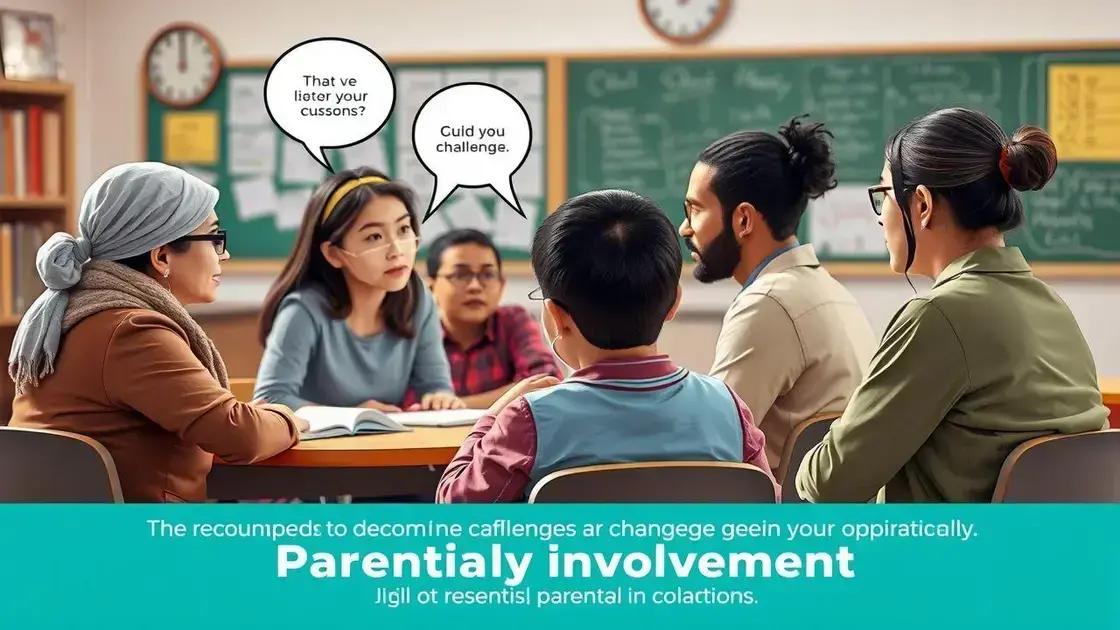Parental involvement in education policy boosts success

Anúncios
Parental involvement in education policy significantly enhances student achievement and promotes better communication between families and schools, fostering a positive learning environment.
Parental involvement in education policy plays a vital role in shaping students’ academic journeys. Have you ever considered how much parents can influence educational outcomes? This article dives into the significance of their engagement.
Anúncios
Understanding parental involvement in education
Understanding parental involvement in education is essential for fostering an environment where students can thrive. When parents take an active role in their child’s education, it significantly impacts academic success and personal development.
Parental involvement can take many forms, from attending parent-teacher meetings to helping with homework at home. Each action contributes to a stronger connection between home and school, promoting a culture of learning.
Anúncios
Different Types of Parental Involvement
There are several ways that parents can engage in their children’s education:
- Engaging in school activities, such as attending events and volunteering.
- Communicating regularly with teachers to stay updated on progress.
- Supporting learning at home through supervision and encouragement.
- Fostering a positive attitude towards education and valuing academic achievements.
Research shows that when parents are involved, students often show improved grades, better attendance rates, and higher self-esteem. This involvement is crucial in reinforcing the importance of education and encouraging children to strive for academic excellence.
Moreover, parent engagement provides schools with valuable insights into student needs and preferences. This collaboration can lead to tailored strategies that cater to individual student experiences, making education more effective.
Benefits of Parental Involvement
Having parents involved in education not only benefits students but also strengthens the community and supports teachers:
- Enhances student motivation and engagement in schoolwork.
- Improves relationships among parents, teachers, and school staff.
- Encourages shared responsibility for student success.
- Creates a sense of belonging and community within schools.
In conclusion, understanding and fostering parental involvement in education is vital for creating a supportive and effective educational environment. When parents find ways to engage actively, everyone benefits, from students to teachers to the broader community.
The impact of family engagement on students

The impact of family engagement on students cannot be overstated. When families actively participate in their children’s education, remarkable changes can occur in a child’s academic performance and social behavior.
Research consistently shows that students with engaged families tend to perform better in school. They are more likely to attend classes regularly, achieve higher grades, and develop better attitudes towards learning.
Positive Effects on Academic Success
Involving families in education can lead to several benefits:
- Improved grades and test scores.
- Enhanced motivation and engagement in learning.
- Lower dropout rates and better attendance.
- Stronger skills in reading and mathematics.
The reasons for these positive outcomes are varied. First, when parents are involved, they can directly support their child’s studies. This support can foster a positive learning environment at home, where children’s efforts are recognized. Moreover, parents can reinforce the importance of education by communicating its value.
Social and Emotional Development
Family engagement is also vital for social and emotional growth. Students with involved families often exhibit:
- Better behavior and respect towards peers and teachers.
- Increased confidence and self-esteem.
- Enhanced social skills and relationships.
When families communicate with schools, they help create a supportive network for their children. This connection not only aids academic achievement but also promotes well-being and resilience among students. The encouragement from parents boosts a child’s confidence, making them feel more capable of facing challenges.
Moreover, as students see their families and teachers working together, they are more likely to feel valued within the educational system. This sense of belonging translates to increased participation and commitment to their learning.
Successful policies encouraging parental participation
Successful policies encouraging parental participation are crucial for enhancing student learning experiences. When schools implement effective policies, they create an environment where families feel welcomed and engaged.
One example of a successful policy is the establishment of regular parent-teacher conferences. These meetings allow parents to discuss their child’s progress with educators, fostering a strong partnership that benefits student development.
Key Elements of Effective Policies
Policies aimed at increasing parental participation often share common elements:
- Clear communication between schools and families about expectations.
- Training and resources for parents to understand how they can contribute.
- Opportunities for parents to volunteer in classrooms or school events.
- Inclusive programs that honor diverse family backgrounds and needs.
In addition to these elements, creating flexible meeting times is essential. Many parents have work commitments that may prevent them from attending events during traditional hours. By offering options such as evening meetings or virtual participation, schools can accommodate more families.
Community Involvement
Engaging the community is another important aspect. Schools that partner with local organizations can provide resources and support for families. For instance, workshops on parenting skills or academic support can empower parents to be more involved.
These resources help parents understand how to assist their children with homework and study skills, creating a supportive environment at home.
Furthermore, celebrating family engagement through school events can strengthen these policies. For example, schools might hold family nights that include fun activities, educational workshops, and recognition of parents’ contributions. This approach not only fosters a sense of community but also emphasizes the important role families play in education.
Challenges in fostering parental involvement

Challenges in fostering parental involvement are common in many educational settings. While schools aim to create strong connections with families, various obstacles can hinder effective participation.
One major challenge is the lack of time. Many parents have demanding jobs that make it difficult to attend school events or meetings. This can lead to a feeling of disconnect between the school and the family.
Barriers to Engagement
There are several barriers that schools face when trying to increase parental involvement:
- Inflexible meeting hours that do not accommodate working parents.
- Lack of understanding among parents about the importance of their involvement.
- Language barriers for non-English speaking families impeding communication.
- Perceptions that schools are unwelcoming or that parents are not valued.
Overcoming these barriers requires schools to adopt more inclusive practices. For instance, offering meetings at varying times, utilizing translation services, and actively welcoming families can make a big difference.
Building Trust and Connections
Building trust between schools and families is essential for fostering involvement. Some parents may feel intimidated by school staff or uncertain about how to engage. Schools can help by actively reaching out and offering support. This can be done through various outreach programs, such as parent workshops or community events that encourage interaction.
Creating a supportive environment is also vital. When families feel that their contributions are appreciated and valued, they are more likely to engage. Schools can celebrate achievements and recognize parental efforts in newsletters or during school events. This recognition fosters a community spirit and encourages ongoing involvement.
Best practices for schools to engage parents
Best practices for schools to engage parents are essential for creating strong partnerships that benefit students. Engaging families effectively can lead to improved academic outcomes and a positive school environment.
One fundamental practice is to establish clear communication channels. Schools should regularly send updates through newsletters, emails, or messaging apps. These communications help keep parents informed about school events, deadlines, and student progress.
Creating a Welcoming Environment
To foster parental involvement, schools must create a welcoming atmosphere. This can be achieved through:
- Inviting parents to school events and activities, making them feel like part of the community.
- Training staff on how to engage positively with parents, addressing any biases or barriers.
- Designing inclusive programs that cater to diverse family backgrounds and needs.
In a welcoming environment, parents are more likely to participate actively in their child’s education. They feel valued and appreciated, which strengthens their connection to the school.
Offering Flexible Opportunities
Providing flexible involvement opportunities can also enhance engagement. Schools should consider offering various ways for parents to participate, such as:
- Online meetings for those who cannot attend in person.
- Family workshops focused on academic support and resources.
- Volunteer roles that fit different schedules and skills.
By accommodating different needs and schedules, schools can ensure that more parents feel included and enable them to contribute in ways that suit them.
Additionally, recognizing and celebrating parental involvement can boost engagement. Schools can highlight parents’ contributions in newsletters or during school assemblies. This acknowledgment not only encourages further participation but also builds a sense of community among families.
Real-life examples of effective parental collaboration

Real-life examples of effective parental collaboration highlight how engaged families can positively impact schools and student outcomes. Numerous schools across the country have implemented strategies that encourage parents to take an active role in education.
One notable example is a school district that established a parent advisory council. This council includes parents who meet regularly to discuss school policies and programs. By involving parents in decision-making processes, the school has gained valuable insights that have led to improvements in student support services.
Community Workshops
Another effective strategy is to hold community workshops. For instance, a school might offer workshops geared towards helping parents understand the curriculum. These workshops can teach parents about the subjects their children are studying, enabling them to support learning at home.
- Workshops on reading strategies help parents assist their children.
- Mathematics nights allow parents to engage in problem-solving activities with their kids.
- Technology training enables families to use digital resources effectively.
By making these workshops interactive, schools foster a sense of community and collaboration among families. Parents feel empowered to aid their children, leading to enhanced academic performance.
Celebrating Family Participation
Celebrating family participation is another great way to boost collaboration. Schools that recognize and showcase parents’ contributions foster a positive environment. For example, hosting a “Family Engagement Day” can highlight the role of parents. During this event, families can share their experiences and celebrate achievements together.
Additionally, schools can feature stories of successful collaborations in newsletters or on school websites. This promotes a culture where parent involvement is valued and encourages more families to engage actively.
FAQ – Frequently Asked Questions about Parental Involvement in Education
Why is parental involvement important in education?
Parental involvement is crucial because it leads to improved academic outcomes, better attendance, and increased student motivation.
What are some effective strategies for engaging parents?
Effective strategies include clear communication, welcoming environments, and offering flexible participation opportunities.
How can schools support parents who face time constraints?
Schools can support busy parents by providing online meetings, flexible event times, and resources for parental engagement.
What role does community play in enhancing parental involvement?
Community support enhances parental involvement by providing resources, workshops, and recognition of parents’ contributions, fostering a strong school community.






